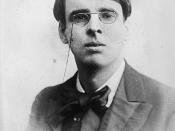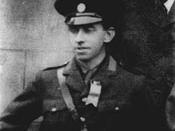Yeats changes his treatment of Irish concerns throughout his life and these changes are reflected in his poetry. Three poems that reflect these changes are 'September 1913', 'Easter 1916' and 'Under Ben Bulben'. These poems show a transpositions in political thought. In 'September 1913' Yeats shows his aversion to democracy and capitalism, and expresses his belief in an aristocratic society preferably governed by elite Protestants, as they had supremacy over Catholics in his view (Chaudhry, 33). The events of the Rising initiated a metamorphosis in Yeats. 'Easter 1916' shows how Yeats (usually not supportive of violence as a political movement) credited it with achieving something (Macrae 77). This poem enables us to see that Yeats' strong belief in politics is beginning to diminish. The last poem 'Under Ben Bulben' was written in Yeats' later stage of life. It shows how Yeats has transposed his treatment of Irish concerns over time, as now, in this poem he places the responsibility not upon the politician or the martyr, but on academia and literature to invoke the new Ireland.
'September 1913' is anti-Catholic in nature. Yeats centers the poem around the need for the new Catholic middle class to come to their senses "What need you, being come to sense" and to stop exiling Protestants "wild geese" to the Continent. In this poem Yeats tries to rekindle the passion for Nationalism that existed whilst John O'Leary was alive. He does this by installing a sense of guilt. "Romantic Ireland's dead and gone / Its with O'Leary in the grave", these lines repeated throughout the poem point out that the Nationalist cause is being forgotten because the leader is no longer there to enforce it. By doing this Yeats attempts to regain the impetus for Nationalism...



Hoba
I thought your essay was O.K. but it could be improved. I seem to be at a loss of words right now.
8 out of 8 people found this comment useful.